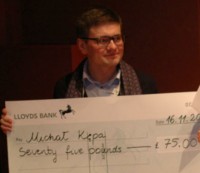School student wins 'Science. Polish Perspectives' awards

School PhD student Michal Kepa was awarded the 1st Audience Award and the 2nd Jury Award for his presentation at the Science. Polish Perspectives conference in Cambridge in November. Here is his report of the event.
Science. Polish Perspectives is a popular science conference addressed at young researchers of Polish origin working abroad, mainly in the UK but also in other countries. The aim of the conference is to popularise science and give an opportunity for young Polish researchers to communicate their research and participate in the discussion of Polish contributions to science.
The conference was held in English and gathered 170 guests and participants from 10 different countries. Several different workshops took place during the event, giving participants a chance to master science communication skills or to take part in technology-applied-to-business case studies.
This was the second Science. Polish Perspectives conference and, thanks to the organisers, it was a huge success and also a very enjoyable event. In my opinion, the best part of the conference was a chance to network and also get to know of opportunities for science communication and possible funding from different institutions, both Polish and international.
Presentation: Listening to Magnetism at Extreme Conditions
Abstract: Imagine that the samples in your laboratory could make sounds to tell you what properties they exhibit. Such an idea does not seem so strange if one applies ultrasound. Ultrasonic probe is mostly known for its application to investigate babies in the mothers’ wombs. However, it can be also used in condensed matter physics to study a variety of electrical and magnetic properties.
In my talk, I explained how ultrasound is used to listen to a sample when it becomes magnetic. I work on the uranium compound UGe2. When exposed to high pressures and very low temperatures, it becomes magnetic and also superconducting, which is a complete loss of electrical resistance. To carry out my project, I designed an apparatus which takes samples to pressures 25000 times greater than the atmospheric one. Magnetism and superconductivity are usually mutually exclusive. Understanding this exotic behaviour is a focus of my research.

